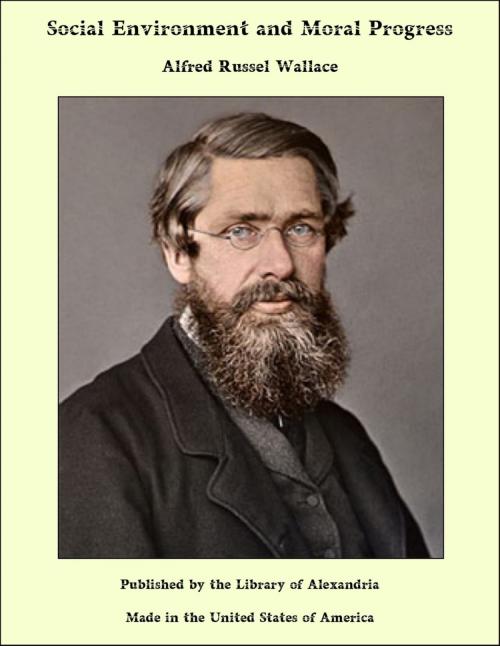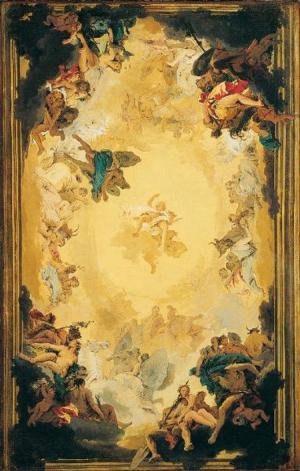Social Environment and Moral Progress
Nonfiction, Religion & Spirituality, New Age, History, Fiction & Literature| Author: | Alfred Russel Wallace | ISBN: | 9781465610720 |
| Publisher: | Library of Alexandria | Publication: | March 8, 2015 |
| Imprint: | Language: | English |
| Author: | Alfred Russel Wallace |
| ISBN: | 9781465610720 |
| Publisher: | Library of Alexandria |
| Publication: | March 8, 2015 |
| Imprint: | |
| Language: | English |
Though much of what we term morality has no absolute sanction in human nature, yet it is to some extent, and perhaps very largely, based upon it. It will be well, therefore, to consider briefly the nature and probable origin of what we term "character"—in individuals, in societies, and especially in those more ancient and more fundamental divisions of mankind which we term "races." Character may be defined as the aggregate of mental faculties and emotions which constitute personal or national individuality. It is very strongly hereditary, yet it is probably subject to more inherent variation than is the form and structure of the body. The combinations of its constituent elements are so numerous as, in common language, to be termed infinite; and this gives to each person a very distinct individuality, as manifested in speech, in emotional expression, and in action. The mental faculties which go to form the "character" of each man or woman are very numerous, a large proportion of them being such as are required for the preservation of the individual and of the race, while others are pre-eminently social or ethical. These latter, which impel us to truth, to justice, and to benevolence, when in due proportion to all the other mental faculties, go to form what we distinguish as a good or moral character, and will in most cases result in actions which meet with the general approval of that section of society in which we live; and this approval reacts upon the character so that it often appears to be better than it really is. So great is the effect of this approval of our fellows that it sometimes leads to behaviour quite different from what it would be if this approval were absent. This is especially the case when the approval leads to wealth or positions of dignity or advantage. Occasionally, in cases of this kind the individual cannot resist his natural impulses, and then acts so as to show his underlying real character. We term such persons hypocrites for making us believe that they were inherently good, instead of being so in appearance only when the good action was profitable to them. Hence in a highly complex state of civilisation it becomes exceedingly difficult correctly to appraise characters as moral or immoral, good or bad; while there is no such difficulty as regards the intellectual and emotional aspects of character, which are less influenced by the general environment, and which there is less temptation to conceal. All the evidence we possess tends to show that although the actions of most individuals are to a considerable extent determined by their social environment, that does not imply any alteration in their character. Everyone's experience of life, and especially the example of his friends and associates, leads him to repress his passions, regulate his emotions, and in general to use his judgment before acting, so as to secure the esteem of his fellows and greater happiness for himself; and these restraints, becoming habitual, may often give the appearance of an actual change of character till some great temptation or violent passion overcomes the usual restraint and exhibits the real nature, which is usually dormant.
Though much of what we term morality has no absolute sanction in human nature, yet it is to some extent, and perhaps very largely, based upon it. It will be well, therefore, to consider briefly the nature and probable origin of what we term "character"—in individuals, in societies, and especially in those more ancient and more fundamental divisions of mankind which we term "races." Character may be defined as the aggregate of mental faculties and emotions which constitute personal or national individuality. It is very strongly hereditary, yet it is probably subject to more inherent variation than is the form and structure of the body. The combinations of its constituent elements are so numerous as, in common language, to be termed infinite; and this gives to each person a very distinct individuality, as manifested in speech, in emotional expression, and in action. The mental faculties which go to form the "character" of each man or woman are very numerous, a large proportion of them being such as are required for the preservation of the individual and of the race, while others are pre-eminently social or ethical. These latter, which impel us to truth, to justice, and to benevolence, when in due proportion to all the other mental faculties, go to form what we distinguish as a good or moral character, and will in most cases result in actions which meet with the general approval of that section of society in which we live; and this approval reacts upon the character so that it often appears to be better than it really is. So great is the effect of this approval of our fellows that it sometimes leads to behaviour quite different from what it would be if this approval were absent. This is especially the case when the approval leads to wealth or positions of dignity or advantage. Occasionally, in cases of this kind the individual cannot resist his natural impulses, and then acts so as to show his underlying real character. We term such persons hypocrites for making us believe that they were inherently good, instead of being so in appearance only when the good action was profitable to them. Hence in a highly complex state of civilisation it becomes exceedingly difficult correctly to appraise characters as moral or immoral, good or bad; while there is no such difficulty as regards the intellectual and emotional aspects of character, which are less influenced by the general environment, and which there is less temptation to conceal. All the evidence we possess tends to show that although the actions of most individuals are to a considerable extent determined by their social environment, that does not imply any alteration in their character. Everyone's experience of life, and especially the example of his friends and associates, leads him to repress his passions, regulate his emotions, and in general to use his judgment before acting, so as to secure the esteem of his fellows and greater happiness for himself; and these restraints, becoming habitual, may often give the appearance of an actual change of character till some great temptation or violent passion overcomes the usual restraint and exhibits the real nature, which is usually dormant.















